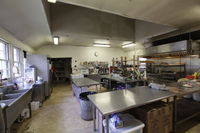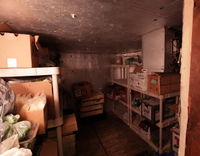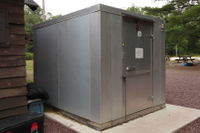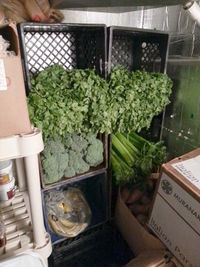Food Supply Manager
Time required: Plan and purchase some items before camp; at camp from move-in to move-out time with some days of break in between, if required
Contents
General Comment
The Food Supply Manager often also serves as the head cook for one, several, or all programs at Family Camp in Summer. But the two roles are not the same, and sometimes the Food Supply Manager will not be at camp for all programs. The Food Supply Manager’s job starts long before camp. She or he plans the menus (with input from the head cooks), orders the supplies, and is responsible for food safety. In contrast, the head cook’s job usually starts when she or he gets to camp.
Planning Before Camp
- Plan menus for whole program with a focus on healthy nutrition: Main meal, snacks, beverages, desserts, baking, afternoon snacks. Ask head cooks for input, they might prefer cooking menus they are already familiar with.
- Calculate quantities needed, and assemble food order.
- Estimate costs to stay within budget. The budget is $3.80 per person per meal (2018). This includes the cost of napkins, disposable dishes and cutlery, and paper towels for the kitchen. Paper plates and bowls are preferred versus styrofoam.
- Place the first food order (don’t order the food for the whole program at once, because storage space at camp is limited and it will be time-consuming to find the currently needed items) one week before camp with food delivery company (presently we use Driscoll, but we have used others in the past). Call to follow up on delivery time and date closer to camp dates. (Driscoll does not deliver on Saturdays and Sundays, but that might change, as we are in negotiation with them.)
- Make shopping list for stores other than the main food suppliers (presently Driscoll) if you need additional food items they don’t carry. (In the past, cooks bought items from Walmart, Asian stores, Trader Joe's and the Amish Market, for example.) However, this depends on the availability of people who can buy items from these stores before camp, so discuss with camp director first (see next point).
- Ask for camp director's help to find shoppers who can bring a few essential food items to camp (if needed). The director will make a reasonable effort to find volunteers who can help and pass on the names and contact information to the Food Supply Manager. (Our experience in the past has shown that this can be difficult, because many participants don’t have a lot of extra space in their vehicles. The amount of items that need to be brought to camp should be minimal.)
- If needed, make shopping list for dinner on arrival day, and the three meals of the first full day and a plan how to buy this food. (Even though Driscoll will deliver on a Monday, they could arrive as late as 3pm; too late for this food to be used for dinner on that day.)
- Find out from camp director about special food requirements (such as vegetarian, gluten-free) of participants and make sure to supply such food options.
To Do on Arrival Day at Camp
(If the Food Supply Manager can’t be at camp, (s)he will need to instruct the head cook to follow these steps)
- Arrange kitchen prior to camp beginning: cleaning items in place by sink, food stored in plastic bins
- Move in kitchen crew is supposed to have wiped down all surfaces and washed all pots, pans, utensils. Check that this happened.
- The large drink containers need to be well cleaned. Make sure the spouts get cleaned.
- Discard all out of dates spices/foods.
- Check walk-in refrigerator and make sure that the food-inspector-approved method of storing vegetables has been applied: Meat on bottom shelves, vegetables above. Temperature must be lower than 38 degrees.
- All items must be 6 inches or more above floor (on wooden pallets and then on the lowest shelf is OK).
- Plastic crates are accepted to be used in the walk-in refrigerator, if needed, but they first need to be cleaned by dipping them for 15 second in water with a disinfectant.
- Check walk-in freezer. Meat always stored on bottom shelves. Veggies above to avoid cross contamination. Temperature must be 0 or lower. Move frozen food out of the walk-in freezer to the walk-in refrigerator two days before needed.
- If you are unclear about safety rules, check The United States Department of Agriculture’s Food Safety Regulations at https://www.fsis.usda.gov/wps/portal/fsis/topics/food-safety-education/get-answers/food-safety-fact-sheets/safe-food-handling/basics-for-handling-food-safely/ct_index
- At camp, receive Driscoll delivery (compare items delivered with your order sheet for accuracy). Make sure to get 2 copies of the invoice; keep one for your records and give the other to the bookkeeper.
- In the evening of the first day, after general orientation, hold a meeting with all kitchen staff and make sure everyone understands their volunteer assignment and is familiar with all food safety instructions. This task can be delegated to the head cook if he or she has worked in the kitchen before.
- On the first full day at camp, stay with cleanup coordinator for each meal (probably a different person for breakfasts, lunches and dinners each) to be sure they know how to clean the kitchen and dining hall and properly put the food leftovers in containers and store them in the refrigerator. This task can be delegated to the head cook if he or she has worked in the kitchen before.
- Double-check dinner times with camp directors. They often are different for different days, depending on the evening activities.
Tasks at Camp
(These tasks can be delegated to the head cook, but the Food Supply Manager needs to ensure they are done properly)
- Make sure all food safety rules are observed.
- Inspect kitchen and food services area for cleanliness and safety.
- Ensure all kitchen helpers/servers wear hairnets and gloves.
- Communicate with camp director if a meal is late as soon as this becomes clear.
- Keep track of inventory, place additional Driscoll order (if needed) before 3:00pm for next day delivery or on Friday for Monday delivery.
- Prepare shopping list if needed for General Affairs. They usually go shopping after breakfast. If needed, include cleaning materials like dish washing soap and sponges.
- Maintain and replace equipment (utensils, small appliances)
- Save all yogurt (and cheese) containers and lids to store food for move out crew at the end of camp. These will be thrown out. Save some plastic ware and plates/bowls for moveout crew meals.
- If there is a lot of leftover food and/or unused food items, adjust the menu and the next food delivery order to avoid waste of food and money.
At the End of Camp
- Direct final cleanup for camp closing.
- Take inventory of all leftover food that can be kept for the next program (spices, cans, etc) and serving utensils (plates, bowl, forks, spoons, and knives).
- If you can’t do the inventory, delegate the task to the head cook
- Communicate with head cooks of Harvest Festival and Spring Gathering so they know what is available and we can avoid waste by not buying the items again
- Give away open items, unused produce. Aim for very little waste.
General Information
- All foods must be stored in plastic containers with lids. Mice can chew through almost anything.
- Children under 12 years are not allowed in the kitchen and can’t be servers or cleanup crew inside the kitchen. Suns (ages 10–11) can help with the cleaning of the dining hall (sweeping the floor and wiping tables).



